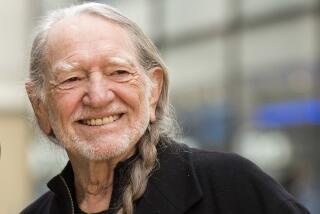Mandelas’ Marriage Fails to Survive 2-Year Reunion
- Share via
JOHANNESBURG, South Africa — The storybook marriage of liberation leader Nelson Mandela and his wife, Winnie, ended with their separation Monday after four years of romantic bliss, 27 years of apartheid-enforced separation and two trying years of political disagreement and marital discord.
“I part from my wife with no recriminations,” a somber Nelson Mandela told reporters summoned to African National Congress headquarters. “I embrace her with all the love and affection I have nursed for her inside and outside prison from the moment I first met her.”
The split between the 73-year-old Mandela and his 57-year-old wife had been brewing since his release from prison in February, 1990. Winnie Mandela has consistently taken a more radical political stance than her husband, and in recent months she also was romantically linked with Dali Mpofu, her deputy in the ANC’s Social Welfare Department.
Nelson Mandela gave no specific reason for the split, blaming “the tensions that have arisen owing to differences between ourselves on a number of issues in recent months.” The decision to separate was mutual, he said.
“My love for her remains undiminished,” he said.
Mandela said he and his wife had never been able “to enjoy a normal family life” because of the demands made on them by their commitment to the ANC. And he said his wife “was an indispensable pillar of support and comfort” to him during his years in prison. He also noted that she had brought up their two daughters by herself and waged a lone, courageous battle against the white-minority government.
“I personally shall never regret the life Comrade Nomzamo and I tried to share together,” he added, using his wife’s African first name.
The ANC president added that the breakup had nothing to do with his wife’s conviction last year on charges of kidnaping and assaulting four young black activists or recent allegations that she was directly involved in the 1989 killings of a 14-year-old activist and a doctor who examined the boy at her Soweto home.
Winnie Mandela has denied the recent allegations, and she has appealed her conviction and six-year prison term. She is free on her personal recognizance pending the outcome of the appeal.
“Comrade Nomzamo has and can continue to rely on my unstinting support during these trying moments in her life,” Nelson Mandela said.
Mandela, flanked by senior ANC officials, declined to answer questions from reporters. But he added one sentence to his prepared statement: “Ladies and gentlemen, I hope you appreciate the pain I have gone through.” Then, walking slowly, he left the room.
The Mandela love affair began in 1958, when the dashing lawyer Nelson, then separated from his first wife, began courting the shy, doe-eyed 23-year-old Winnie. While on a summer drive, he pulled the car over to the roadside and proposed marriage.
It didn’t worry Nomzamo Winifred Madikizela that her husband-to-be was on trial for treason (he was later acquitted of that charge), that he was 16 years her senior or that his sophisticated friends regarded her as too young and naive to be a revolutionary’s wife.
Years later, writing to Winnie from prison, Nelson admitted he had agonized over having “abandoned this young and inexperienced woman in a pitiless desert, literally throwing her into the hands of highwaymen.”
Winnie Mandela, though, turned out to be made of stronger fiber than anyone guessed. She supported her husband’s cause through relentless police raids, several dozen arrests, banning orders and banishment from Soweto to the distant Orange Free State township of Brandfort. She once knocked a policeman to the floor after he refused to allow her to change clothes before being taken into custody.
But the tables turned on her in 1989. Many in her Soweto neighborhood complained about the strong-arm tactics of her young bodyguards, accusing them of using the powerful Mandela name to gain entrance to nightclubs and even to commit murders.
The internal anti-apartheid movement, then known as the Mass Democratic Movement, publicly ostracized her, and her husband, from his jail cell, demanded that she disband the bodyguard retinue, known as the Mandela United soccer club. Winnie Mandela, exhibiting the same streak of independence that had won her admiration worldwide, ignored her critics.
When her husband was released from prison, she said she had turned over a new leaf. In an interview with The Times, she said she was enjoying her new role in her husband’s shadow. But her political ambitions soon surfaced, to Mandela’s chagrin.
“Nelson really wanted a wife. He didn’t want a politician,” said Fatima Meer, a Durban professor and close friend of the Mandelas. “But, with all those years of her support, he couldn’t stand in her way.”
The breakup, by itself, is not likely to threaten Winnie Mandela’s position on the ANC’s National Executive Committee or as head of the Social Welfare Department. She and her husband had been living apart since November, at first because of threats on his life but later by mutual agreement.
But her political standing has been badly scarred by her trial conviction and a series of allegations made in recent days by her former close associates. Those allegations have damaged her reputation among many blacks. And although she still is strongly supported by younger, more radical ANC members, her political future now is in doubt.
Winnie Mandela’s driver, John Morgan, a co-defendant in last year’s kidnaping and assault trial, says he lied on the stand to protect her, according to published reports in South Africa. She, Morgan and Xoliswa Falati were charged with kidnaping four youths from a Methodist church halfway house in late December, 1988, and assaulting them. One, 14-year-old Stompie Seipei, later died of injuries sustained at the Mandela home.
During the trial, Morgan had testified that Winnie Mandela was not present during the assaults and had not ordered the kidnaping. Now Morgan says she led the beatings and, a few days later, ordered him to remove Seipei from her house and “dump the dog.” Seipei did not appear to be alive at the time, Morgan says.
The trial judge, in convicting the three defendants, did not believe Morgan’s testimony, which contradicted his earlier statements to police.
More to Read
Sign up for Essential California
The most important California stories and recommendations in your inbox every morning.
You may occasionally receive promotional content from the Los Angeles Times.











